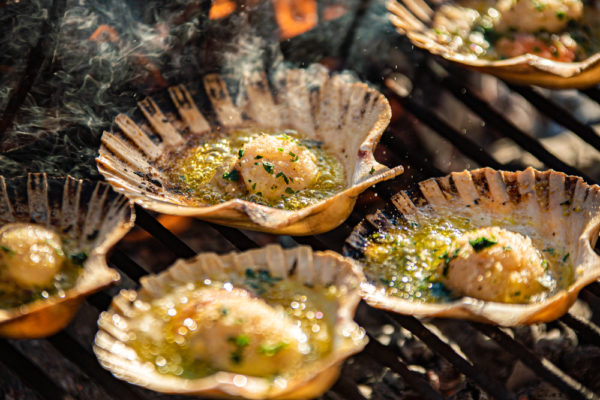Tips for Cooking Seafood on the Grill

When cooking seafood on the grill, you should take the same precautions as when you’re cooking meat, but there are a few extra things to bear in mind.
As standard, you should keep meat and seafood in the refrigerator until you’re ready to cook them. Avoid leaving them out of the fridge because, on a warm summer’s day, the temperature will drop much quicker. As well as washing your hands, you should also wash your utensils and surfaces frequently to prevent cross-contamination.
Hygiene importance aside, when it comes to cooking seafood on the grill, we have some tips to make your life easier.
Choose the Right Types of Seafood
With so much seafood variety, there are plenty of options to choose from. So how should you choose which seafood to grill? The texture is a good way to determine whether or not particular seafood is a good choice.
For fish, very flaky fish like cod will likely fall apart, and you’ll lose some of the flakes to your coals. Opt for firm fish like monkfish and swordfish, which hold their shape much better when heated.
Aside from fish, seafood like octopus and squid is ideal for grilling because it won’t fragment as it cooks. These seafood items are more sturdy and can withstand the high heat of a grill.
Avoid Overhandling
The temptation when you have the tongs handy is to over-handle whatever is on your grill. Some seafood items are more delicate, so when you cook seafood on the grill, flip it just once. You’ll still get an even cook on both sides but won’t have to deal with dropping bits of seafood into the fire.
Leaving it to cook can also help retain the seafood’s juices, making your final dish nice and moist. Overhandling can squeeze out moisture and damage seafood items, so patience is key!
Cook Whole Seafood on the Grill
As with what happens to lots of food when it connects with the grill’s heat, seafood can shrink. To ensure your portions are generous and avoid seafood dropping through the racks, cook your seafood whole where possible.
Seafood items like cuttlefish, octopus, and squid are great to cook and serve whole. Instead of turning individual portions, you can flip the whole body to manage heat and get an even firing. Whole seafood from the grill also makes a great centerpiece when you have guests!
Use Foil Packs
For any seafood items you don’t cook whole, make up foil parcels to place onto the grill. This is a great way to cook seafood on the grill without cooking directly on the rack and keeps your seafood deliciously moist.
Cooking mussels and clams in foil packs is an excellent way to add variety, and the shells lend themselves to scooping up all the juicy goodness that pools in the foil! Drizzle some nice quality olive oil, a squeeze of lemon, and season before parceling up and adding to the grill. When you open the foil, your seafood will be steamed and ready to eat, complete with dipping sauce.
Try Skewers for Your Seafood
Skewers are an ideal tool for cooking seafood on the grill, and you can load them up with just about anything! They’re great to cook on skewers if you prefer to eat your squid in calamari rings rather than serving it whole. Alternate with other seafood items or firm vegetables like peppers, onions, and mushrooms for a variety of flavors, textures, and colors!
To make your life even easier, we have perfectly portioned shrimp and scallop skewers available to buy. The sweetness of this combination is perfectly balanced with the charred flavor from the grill, and thanks to their robust texture, they won’t break apart as they cook. Skewers make it easy to cook and turn your seafood on the grill and less messy to eat, too!
Reduce the Risks
One of the main reasons people are apprehensive about barbecues is that there is a risk of undercooking your food. Opt for pre-cooked seafood to reduce the risk of food poisoning when cooking seafood on the grill.
Items like our blanched octopus tentacles are cooked before freezing, so you just need to defrost and reheat, eliminating the worry of serving undercooked seafood.
Instances of food poisoning peak in the summer months, so taking precautions will save you any likelihood of getting unwell. When using fresh seafood, you always have the option to oven-cook or pan-fry before finishing off on the grill for additional peace of mind.
For more seafood inspiration, check out our recipe suggestions.

